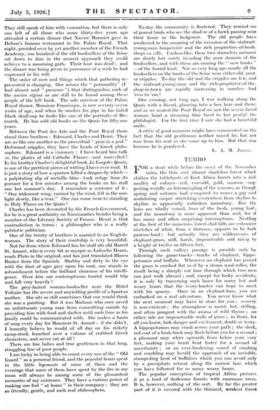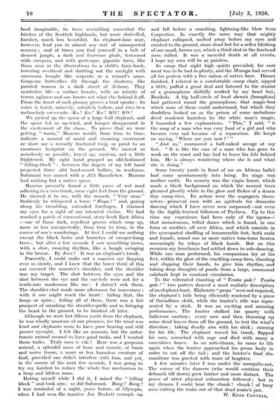TEMBO
Through such valleys passage is possible only by following the game-tracks—tracks of elephant, hippo- potamus and buffalo. Wherever an elephant has passed the grass is crushed flat as if by a steam road-roller, the result being a sharply cut lane through which two men can just walk abreast ; and, except for lucky accidents, it is only by traversing such lanes for many hot and weary hours that the ivory-hunter can hope to meet with his quarry. Once in an elephant-lane, you are embarked on a real adventure. You never know what the next moment may have in store for you ; scenery is non-existent ; the atmosphere is moist, hot, stifling, and often pungent with the aroma of wild thyme ; on either side are impenetrable walls of grass ; in front, for all you know, lurk danger and excitement, death or ivory. A hippopotamus may crash across your path ; the sleek, red coat of a bush-buck may flash before you for a second ; a pheasant may whirr upwards from below your very feet, making your heart beat faster for a second of uncertainty ; or an ever-loudening sound of crashing and crackling may herald the approach of an invisible, stampeding herd of buffaloes which you can avoid only by a precipitate retreat along the narrow lane which you have followed for so many weary hours.
The popular conception of tropical Africa pictures it as a land of darksome forests with enormous trees. It is, however, nothing of the sort. By far the greater part of it is covered with the thinnest, . weakest forest land imaginable, its trees resembling somewhat the birches of the Scottish highlands, but more shrivelled, harsher, much less beautiful. An elephant-lane may, -however, lead you to almost any sort of unsuspected - scenery ; and at times you find yourself in a belt of densest jungle, a dark and fearsome glade, festooned with creepers, and with grotesque, gigantic trees, like those seen in the illustrations to a child's fairy-book, towering overhead and shutting out the sunlight with enormous boughs like serpents or a wizard's arms. Gorgeous butterflies flit through the shadows, like painted women in a dark street of ill-fame. They symbolize life—a surface beauty, with an infinity of terror, ugliness and one knows not what else behind it all. From the heart of such gloomy groves a bird speaks : its voice is harsh, unlovely, infinitely hollow, and rises to a melancholy crescendo—Ko ! Ko ! Ko ! KO! KO!
We picked up the spoor of a large bull elephant, and the spoor led us up-wind, and hunger disappeared in the excitement of the chase. To prove that we were getting "warm," Maneno would, from time to time, indicate a mound of moist and steaming excrement or show me a recently fractured twig, or point to an enormous footprint on the ground. We moved as noiselessly, as possible, keyed up, anxious, not a little frightened. My right hand grasped an old-fashioned " falling-block " : between the fingers of my left hand projected three .459 hard-nosed bullets, in readiness. Sulumani was armed with a .375 Mannlicher. Maneno had nothing but a native spear.
Maneno presently found a little piece of wet mud adhering to a tree-trunk, some eight feet from the ground. He showed it to me, with the remark, "Very near." Suddenly he whispered a tense " Huyu " and, gazing along his trembling, extended forefinger, I strained my eyes for a sight of our intended victim. We had reached a patch of conventional, story-book East Africa —one of those dark, repellent groves which crop up, more or less unexpectedly, from time to time, in the course of one's wanderings. At first I could see nothing except the black boles and branches of creeper-hung trees ; but after a few seconds I saw something move, with a slow, swaying rhythm, like a bough swinging in the breeze. By .Jove! It was an elephant's trunk.
Presently, I could make out a massive ear flapping ever so slowly, and I knew that the lower third of this ear covered the monster's shoulder, and the shoulder was my target. The shot between the eyes and the shot between the eye and the ear-hole were not for a tenth-rate marksman like me : I daren't risk them. The shoulder-shot made more allowance for inaccuracy : with it one might reach the heart ; failing that, the lungs or spine ; failing all of these, there was a fair prospect of smashing the shoulder-girdle and so bringing the beast to the ground, to be finished off later.
Although we were but fifteen yards from the elephant, he was wholly unaware of our presence, for the wind was kind and elephants seem to have poor hearing and still poorer eyesight. I felt like an assassin, but the unfor- tunate animal seemed to have good tusks, and I wanted those -tusks. Truly man is vile ! Here was a gorgeous &Mina], a splendid mass of bone and muscle, of brain and nerve tissue, a more or less harmless creature of God, provided one didn't interfere with him, and yet, in the course of the next few seconds, I was going to try my hardest to reduce the whole fine Mechanism to a limp and lifeless mass.
- Hating myself while I did it, I raised the "falling block" and took aim : so did Sulumani. Bang! Bang!
I was reminded of a night, years before, at Olympia, when I had seen the massive Joe Beckett cruniple up and fall before a smashing, lightning-like blow from Carpentier. In exactly the same way that mighty elephant collapsed, melted away before my eyes arid crashed to the ground, stone dead but for a reflex blinking of one small, brown eye, which a third shot in the forehead soon stilled. It was a merciful death at all events. I hope my own will be as painless.
In camp that night high spirits prevailed, for now meat was to be had in plenty, and the Alzungu had served all his porters with a free ration of native beer. Dinner finished, I relaxed in a comfortable camp chair, sipped a little, puffed a great deal and listened to the strains of a gramophone skilfully worked by my head boy, Basikola. A big half-circle of local shenzis (bumpkins) had gathered round the gramophone, that magic-box, which none of them could understand, but which they doubtless looked on as the prison of some melodious devil rendered harmless by the white man's magic. I hazarded a few explanations. "This," I said, "is the song of a man who was very fond of a girl and who became very sad because of a separation. He keep.h on saying, 'Where are you now ? ' " "Just so," murmured a half-naked savage at my feet. "It is like the ease of a man who has gone to work on the coast and has had to leave his bibi behind him. He is always wondering where she is and what she is doing."
Some twenty yards in front of me an African ballet had come spontaneously into being. Its stage wa mother earth. Its scenery was the virgin forest, which made a black background on which the nearest trees gleamed ghostly white in the glow and flicker of a dozen tiny camp-fires. Its actors were the wapagazis them- selves—primeval men with an aptitude for dramatic dancing which I have never seen surpassed—not even by the highly-trained followers of Pavlova. Up to this time my experience had been only of the ngoma--i that monotonous, tribal dance which is found, in one form or another, all over Africa, and which consists in the syncopated shuffling of innumerable feet, both male and female, round one or more native tom-toms beaten unceasingly by relays of black hands. But on this occasion my henchmen had settled down to solo-dancing. While one man performed, his companions lay at his feet, within the glow of the crackling camp-fires, chanting and clapping their hands, to give him rhythm, and taking deep draughts of pombe from a large, communal calabash kept in constant circulation.
To the reiterated chanting of " Tenth° yule ! Tembo yule ! " two porters danced a most realistic description of an elephant hunt. Elaborate "props "were not required, the elephant's hide being efficiently rendered by a piece of threadbare cloth, while the hunter's rifle was repre- sented by a stick. It was an exciting and amusing performance. The hunter stalked his quarry with ludicrous caution ; every now and then throwing up some dead leaves from off the ground, to test the wind's direction ; taking deadly aim with his stick ; running for his life. The elephant waved his trunk, flapped his ears, screeched with rage and died with many a• convulsive heave. As an anti-climax, he came to life again when the hunter approached his prone body in order to cut off the tail ; and the hunter's final dis- comfiture was greeted with roars of laughter.
A few minutes later I was under the mosquito-net.
The voices of the dancers (who would continue their debauch till dawn) grew fainter and more distant. The peace of utter physical exhaustion followed ; but in my dreams I could hear the chunk! chunk ! of busy axes cutting the tusks out of that dead tembo's- jaw.
W. KERR CONNELL.











































 Previous page
Previous page